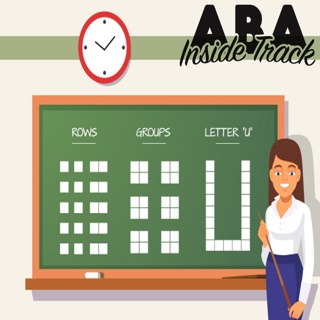
Episode 183 - Preference Assessments 2.0 w/ Dr. Christopher Tullis
This week our special guest, Dr. Christopher Tullis, joins us to discuss his thorough literature review of preference assessment research. In addition, we take a side-trip to reflect on indices of happiness and review why "happy" isn't such a bad word. Plus, Rob shares his beef with the MSW; only one of them comes out of this episode alive! This episode is available for 1.0 LEARNING CEU. Articles discussed this episode: Tullis, C.A., Cannella-Malone, H.I., Basbigill, A.R., Yeager, A., Fleming, C.V., Payne, D., & Wu, P. (2011). Review of the choice and preference assessment literature for individuals with severe to profound disabilities. Education and Training in Autism and Developmental Disabilities, 46, 576-595. http://www.jstor.org/stable/24232368 Richman, D.M., Barnard-Brak, L., Abby, L., & Grubb, L. (2016). Multiple-stimulus without replacement preference assessment: Reducing the number of sessions to identify preferred stimuli. Journal of Developmental and Physical Disabilities, 28, 469-477. doi: 10.1007/s10882-016-9485-1 Dillon, C.M. & Carr, J.E. (2007). Assessing indices of happiness and unhappiness in individuals with developmental disabilities: A review. Behavioral Interventions, 22, 229-244. doi: 10.1002/bin.240 If you're interested in ordering CEs for listening to this episode, click here to go to the store page. You'll need to enter your name, BCBA #, and the two episode secret code words to complete the purchase. Email us at abainsidetrack@gmail.com for further assistance.
27 Okt 20211h 6min

Episode 182 - Instructional Choice
For a variety of reasons, classroom management systems aren't always readily adopted in our schools. Could it be because they're too hard to maintain? Or ineffective? This week, we take a look at one such, easy-to-use, simple-to-master system, instructional control. Join us as we review chair choosing, work picking, and data analyzing to get to determine if instructional choice may be right for you! This episode is available for 1.0 LEARNING CEU. Articles discussed this episode: Bicard, D.F., Ervin, A., Bicard, S.C., & Baylot-Casey, L. (2012). Differential effects of seating arrangements on disruptive behavior of fifth grade students during independent seatwork. Journal of Applied Behavior Analysis, 45, 407-411. doi: 10.1901/jaba.2012.45-407 Romaniuk, C., Miltenberger, R., Conyers, C., Jenner, N., Jurgens, M., & Ringenberg, C. (2002). The influence of activity choice on problem behaviors maintained by escape versus attention. Journal of Applied Behavior Analysis, 35, 349-362. doi: 10.1901/jaba.2002.35-349 Lane, K.L., Royer, D.J., Messenger, M.L., Common, E.A., Ennis, R.P., & Swogger, E.D. (2015). Empowering teachers with low-intensity strategies to support academic engagement: Implementation and effects of instructional choice for elementary students in inclusive settings. Education and Treatment of Children, 38, 473-504. doi: 10.1353/etc.2015.0013 Royer, D.J., Lane, K.L., Cantwell, E.D., & Messenger, M.L. (2017). A systematic review of the evidence base for instructional choice in K-12 settings. Behavioral Disorders, 42, 89-107. doi: 10.1177/0198742916688655 If you're interested in ordering CEs for listening to this episode, click here to go to the store page. You'll need to enter your name, BCBA #, and the two episode secret code words to complete the purchase. Email us at abainsidetrack@gmail.com for further assistance.
20 Okt 20211h 13min

Episode 181 - Contingencies During Delay Training w/ Dr. Mahshid Ghaemmaghami
Now, everybody loves functional communication. Only problem: at some point, the delay between functional communication and reinforcement has to reach a natural timing. And that's where everything falls apart. Rather than hope for the best, why not plan for it instead? Dr. Mahshid Ghaemmaghami joins us to discuss her research on this very topic and flips the script on the skill formerly known as "delay tolerance." This episode is available for 1.0 LEARNING CEU. Articles discussed this episode: Ghaemmaghami, M., Hanley, G.P., & Jessel, J. (2016). Contingencies promote delay tolerance. Journal of Applied Behavior Analysis, 49, 548-575. doi: 10.1002/jaba.333 If you're interested in ordering CEs for listening to this episode, click here to go to the store page. You'll need to enter your name, BCBA #, and the two episode secret code words to complete the purchase. Email us at abainsidetrack@gmail.com for further assistance.
13 Okt 20211h 15min

October 2021 Preview
Throw on your sweater and grab a big ol' mug of pumpkin spice latte. It's a spooky preview for this month's episodes. Between attending conferences and raking leaves, we'll be hearing from Dr. Christopher Tullis about updates to preference assessment methodology, practicing delay tolerance training with Dr. Mahshid Ghaemmaghami, and exploring the utility of ceding instructional control in classrooms. Don't forget to say "hi" if you're attending the BABAT or Thompson Center for Autism conferences this month! Articles for October 2021 Delay Tolerance Training w/ Dr. Mahshid Ghaemmaghami Ghaemmaghami, M., Hanley, G.P., & Jessel, J. (2016). Contingencies promote delay tolerance. Journal of Applied Behavior Analysis, 49, 548-575. doi: 10.1002/jaba.333 Instructional Choice Bicard, D.F., Ervin, A., Bicard, S.C., & Baylot-Casey, L. (2012). Differential effects of seating arrangements on disruptive behavior of fifth grade students during independent seatwork. Journal of Applied Behavior Analysis, 45, 407-411. doi: 10.1901/jaba.2012.45-407 Romaniuk, C., Miltenberger, R., Conyers, C., Jenner, N., Jurgens, M., & Ringenberg, C. (2002). The influence of activity choice on problem behaviors maintained by escape versus attention. Journal of Applied Behavior Analysis, 35, 349-362. doi: 10.1901/jaba.2002.35-349 Lane, K.L., Royer, D.J., Messenger, M.L., Common, E.A., Ennis, R.P., & Swogger, E.D. (2015). Empowering teachers with low-intensity strategies to support academic engagement: Implementation and effects of instructional choice for elementary students in inclusive settings. Education and Treatment of Children, 38, 473-504. doi: 10.1353/etc.2015.0013 Royer, D.J., Lane, K.L., Cantwell, E.D., & Messenger, M.L. (2017). A systematic review of the evidence base for instructional choice in K-12 settings. Behavioral Disorders, 42, 89-107. doi: 10.1177/0198742916688655 Preference Assessments 2.0 w/ Dr. Christopher Tullis Tullis, C.A., Cannella-Malone, H.I., Basbigill, A.R., Yeager, A., Fleming, C.V., Payne, D., & Wu, P. (2011). Review of the choice and preference assessment literature for individuals with severe to profound disabilities. Education and Training in Autism and Developmental Disabilities, 46, 576-595. http://www.jstor.org/stable/24232368 Richman, D.M., Barnard-Brak, L., Abby, L., & Grubb, L. (2016). Multiple-stimulus without replacement preference assessment: Reducing the number of sessions to identify preferred stimuli. Journal of Developmental and Physical Disabilities, 28, 469-477. doi: 10.1007/s10882-016-9485-1 Dillon, C.M. & Carr, J.E. (2007). Assessing indices of happiness and unhappiness in individuals with developmental disabilities: A review. Behavioral Interventions, 22, 229-244. doi: 10.1002/bin.240
6 Okt 202122min

Episode 180 - (ETHICS) Promoting Ethical Leadership w/ Dr. Manuel Rodriguez
As a capper to Supervision September, we follow up last week's episode on ethical supervision to explore just what it takes in the ABA Workplace to create strong leaders that promote ethical practice in every way. And since that requires discussing business things, we tapped Dr. Manny Rodriguez to share his extensive work on researching that very topic in OBM. But first, he shows us how to file our TPS reports! This episode is available for 1.0 ETHICS CEU. Articles discussed this episode: Diener, L.H., McGee, H.M., & Miguel, C.F. (2009). An integrated approach for conducting a behavioral systems analysis. Journal of Organizational Behavior Management, 29, 108-135. doi: 10.1080/01608060902874534 Rodriguez, M. (2020). Identifying effective systems and processes to promote ethical workplace cultures in the applied behavior analysis (ABA) therapy industry [Doctoral dissertation, University of South Florida]. Scholar Commons.https://digitalcommons.usf.edu/etd/8483/ If you're interested in ordering CEs for listening to this episode, click here to go to the store page. You'll need to enter your name, BCBA #, and the two episode secret code words to complete the purchase. Email us at abainsidetrack@gmail.com for further assistance.
29 Sep 20211h 35min

Episode 179 - (SUPERVISION) The Ethics of Supervision
Due to the exponential growth of certified behavior analysts in the world, the number of supervisors needed per year requires more and more newly-certified individuals to step into this role. How can a field continue to grow skilled and ethical members when there aren't enough seasoned practitioners to go around? This week, we review the state of supervision in the behavior analytic world and some research-based suggestions for creating a culture that sees high-quality supervision as an ethical pre-requisite for practice. This episode is available for 1.0 SUPERVISION -OR- 1 ETHICS CEU. Articles discussed this episode: Sellers, T.P. Alai-Rosales, S., & MacDonald, R.P.F. (2016). Taking full responsibility: The ethics of supervision in behavior analytic practice. Behavior Analysis in Practice, 9, 299-308. doi: 10.1007/s40617-016-0144-x LeBlanc, L.A., Onofrio, O.M., Valentino, A.L., & Sleeper, J.D. (2020). Promoting ethical discussions and decision making in a human service agency. Behavior Analysis in Practice, 13, 905-913. doi: 10.1007/s40617-020-00454-7 Hajiaghamohseni, Z., Drasgow, E., & Wolfe, K. (2021). Supervision behaviors of board certified behavior analysts with trainees. Behavior Analysis in Practice, 14, 97-109. doi: 10.1007/s40617-020-00492-1 Turner, L.B., Fischer, A.J., & Luiselli, J.K. (2016). Towards a competency-based, ethical, and socially valid approach to the supervision of applied behavior analytic trainees. Behavior Analysis in Practice, 9, 287-298. doi: 10.1007/s40617-016-0121-4 If you're interested in ordering CEs for listening to this episode, click here to go to the store page. You'll need to enter your name, BCBA #, and the two episode secret code words to complete the purchase. Email us at abainsidetrack@gmail.com for further assistance.
22 Sep 20211h 21min

Episode 178 - (SUPERVISION) How to Win Friends and Influence People Book Club, pt. 2 w/ Alan Haberman
It's the final reckoning for our How to Win Friends and Influence People Book Club with our book club muse, Alan Haberman. We round out our discussion by getting to the leadership portions of the book and give our final judgments as to whether following these tips for "a new way of life" will have you supervising like a boss or like a Depression-era door-to-door salesman. This episode is available for 1.0 SUPERVISION CEU. Articles discussed this episode: Carnegie, D. (1936). How to win friends & influence people: The only book you need to lead you to success (1981 edition). New York, New York: Gallery Books. McHugh, J. (2021). How to win friends and influence people (1936). In Americanon: An unexpected U.S. history in thirteen bestselling books (pp. 218-251). New York, New York: Dutton. Fong, E.H., Capell, S., Adedipe, H. An open discussion about race and diversity in behavior analysis [Webinar]. Behavioral Health Center of Excellence. https://bhcoe.org/project/an-open-discussion-about-race-diversity-in-behavior-analysis/ If you're interested in ordering CEs for listening to this episode, click here to go to the store page. You'll need to enter your name, BCBA #, and the two episode secret code words to complete the purchase. Email us at abainsidetrack@gmail.com for further assistance.
15 Sep 20211h 20min

Episode 177 - How to Win Friends and Influence People Book Club, pt. 1 w/ Alan Haberman
To kick off Supervision September, we're going back to the ur-supervision book, "How To Win Friends and Influence People" by Dale Carnegie. And, like most of our book club episodes the recording was a) too long and needed to be broken into two parts and b) features Alan Haberman with hot takes for days! Will HTWFIP stand the test of time or be banished to the remainder bin of history? This episode is available for 1.0 SUPERVISION CEU. We're in the process of planning the new year of ABA Inside Track. If you've got some time, we'd appreciate it if you shared you thoughts on a short survey. Thank you! Articles discussed this episode: Carnegie, D. (1936). How to win friends & influence people: The only book you need to lead you to success (1981 edition). New York, New York: Gallery Books. McHugh, J. (2021). How to win friends and influence people (1936). In Americanon: An unexpected U.S. history in thirteen bestselling books (pp. 218-251). New York, New York: Dutton. Fong, E.H., Capell, S., Adedipe, H. An open discussion about race and diversity in behavior analysis [Webinar]. Behavioral Health Center of Excellence. https://bhcoe.org/project/an-open-discussion-about-race-diversity-in-behavior-analysis/ If you're interested in ordering CEs for listening to this episode, click here to go to the store page. You'll need to enter your name, BCBA #, and the two episode secret code words to complete the purchase. Email us at abainsidetrack@gmail.com for further assistance.
8 Sep 20211h 37min






















